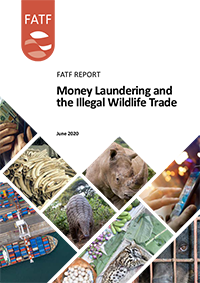Money Laundering and the Illegal Wildlife Trade

25 June 2020 – The illegal wildlife trade is a major transnational organised crime, which generates billions of criminal proceeds each year. The Financial Action Task Force (FATF) has conducted a new study to provide guidance to countries on measures they can take to combat money laundering from the illegal wildlife trade.
Wildlife traffickers exploit weaknesses in the financial and non-financial sectors, to move, hide and launder their proceeds, enabling further wildlife crimes and damaging financial integrity. One of the most effective ways to identify the broader criminal networks and take the profit out of this crime, is to follow the financial trails of wildlife traffickers.
Despite the significant criminal gains involved, countries and private sector are not prioritising efforts to trace and combat financial flows from this trade in line with risk. To combat the financial flows from the illegal wildlife trade, countries should therefore as a priority:
- Identify and assess their money laundering risks relating to the illegal wildlife trade.
- Ensure that national laws and powers for law enforcement allow authorities to go after the finances of wildlife traffickers, and to pursue financial investigations.
The private sector also has an important role to play in combatting financial flows from illegal wildlife trade. This study therefore identifies good practices and risk indicators to assist private sector and countries to identify potential suspicious financial activity for the illegal wildlife trade.
This is the FATF’s first global report on this topic. It draws on inputs and case studies from over 50 countries from across the FATF Global Network and observers, as well as civil society and the United for Wildlife Financial Taskforce.
Article Credit: http://www.fatf-gafi.org/publications/methodsandtrends/documents/money-laundering-wildlife-trade.html
